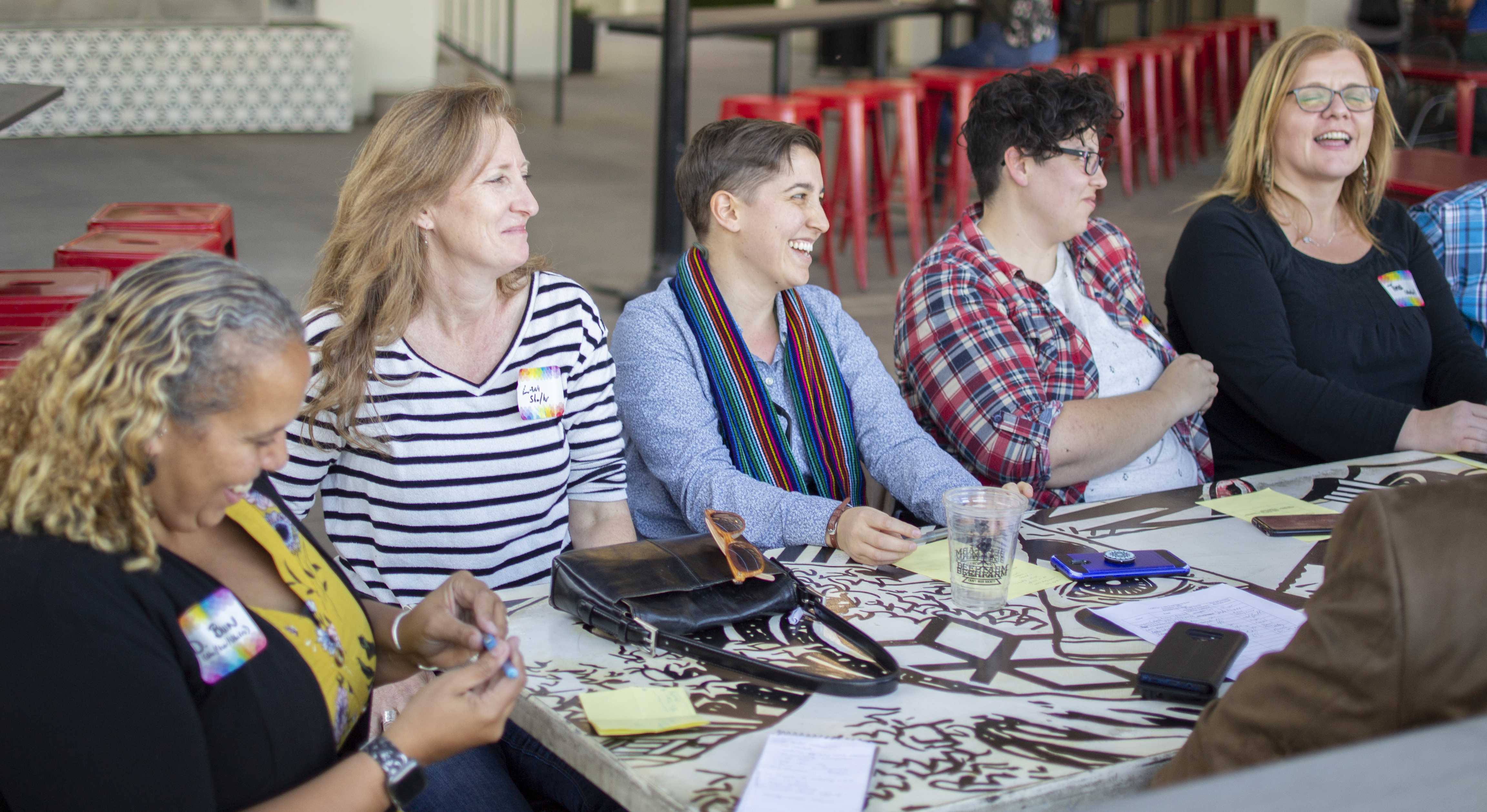
By Leo Cabral
Riverside City College’s ALLIES hosted a social to find support and discuss action to bring visibility to LGBTQ+ people on campus.
RCC’s website describes an ally as “a visible member of the Riverside Community College District community (staff, faculty or students) who is willing to provide a safe haven and an empathetic ear to anyone concerned with sexual orientation or gender identity issues.”
They met at the Food Lab in Downtown Riverside for the ALLY Social on Nov 1. RCC students, LGBTQ+ members and allies alike were all invited to join the conversation. Some faculty and staff from Student Services, the English Department and Student Health and Psychological services were eager to open the dialogue for change and inclusivity.
Wendy Silva and Deborah “D” Brown, who played a hand in bringing the community together, were in attendance. When Silva first started working at RCC this year, she noticed LGBTQ+ staff lacked visibility and community. She asked around and found there was no established LGBTQ+ group she could join. Driven by the need for support and visibility, Silva and Brown started networking.
“D (Brown)… she just got hired as well,” Silva said. “I talked to her and she was like, ‘Yeah, I really want to get this group started!’
“I was like, ‘Me too! Let’s connect everyone and just do it.’ So in the past month we’ve had two meetings and this is our first social.”
The event was meant to create a casual social setting for the RCC community to get to know one another. But after breaking the ice, everyone began to talk about what is needed to improve the LGBTQ+ community’s experience at RCC.
“Everything, as you can see, is still a little bit chaotic,” Silva said. “We have a lot of goals: visibility, we would like to have a resource center but we don’t have funding, we need data for the funding. We need a lot of things, but mostly to get us talking about each other and to love each other and support each other. That’s really the goal.”
Faculty like Dean of Student Services Thomas Cruz-Soto, Student Success Specialist Allan Forbes, Debbie Whitaker from Early Childhood Development and economics instructor Amber Casolari were just a few of approximately 15 who joined the conversation.
Among the discussions at the Ally Social were hopes for a resource center including a mentor program.
“A thought that we’ve been talking about (is) having a mentor program where all of the ALLY trained faculty staff who would like to be available to mentor a student,” Whitaker said. “(Then) we make a list by subject area and then we advertise to students that if they would like an ALLY member as a mentor they would make a request.”
One of the group’s main concerns was funding and how to acquire it. In order to receive funding for resources for the LGBTQ+ community at RCC there needs to be sufficient data to back it up.
“I think the goals are really meant for the next three to five years and/or longer than that,” Brown said. “Some of it is focused on major issues: one, visibility,” Brown said. “And some of the visibility includes finding data so that we can actually map our students and figure out where they are, but also create a visible community of faculty and staff so that we have folks that can provide mentorship and can be contacts for students that need that support. Beyond that we’re also looking for funding and hopefully, eventually we will get a space. That would be the ideal part, that we would get a queer and trans center where folks can actually feel safe and walk in and there would be services and resources that would be attached to that space.”
Because gathering data is such a large task, Silva and Brown have helped create the LGBTQ+ Taskforce as a separate entity to the ALLY Social. The Taskforce is meant to address the issues that face the LGBTQ+ community on campus while the ALLY Socials are more focused on the social and networking aspects of building community.
“The goal of the Taskforce is to take on these different initiatives that we’ve talked about,” Silva said. “You can see that we have a lot of goals that we want to achieve in the next few years, but we also want to have the social aspect of the Taskforce. The Taskforce is going to be much more goal-oriented much more addressing the needs and issues of the faculty and the staff and the students. But we also want to have maybe a committee within that that takes charge of getting events like this together. I know we became very goal-oriented here, it seems like everyone is kind of ready but we do want to have this space where people within our community and allies can just get together and know each other and know that there’s support.”
The ALLY Social was an overall success. Once everyone addressed issues and possible solutions facing the LGBTQ+ community at RCC the conversation evolved into one filled with laughter and smiles mixed with the delicious aromas of dishes served at the Food Lab. There is a lot of hope for the future of the LGBTQ+ community on campus.






